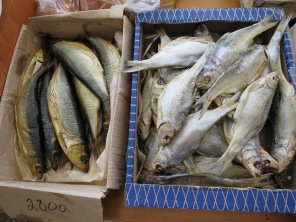Our one month visa in Uzbekistan was always going to be stretched. We were both very aware of the blue tiled silk route cities that adorn the country with spectacular minarets, domes and madrassas which have to be high on any tourists agenda but throw in yurt camps in off the beaten track desert areas and Margilon, the centre of silk production in Asia, plus days lost with travellers tummy, it was looking pretty impossible. The obvious answer was to short cut the cycling to get us quickly from one place to another. It feels like cheating; we’re on a bike trip and want to be able to hold our heads up, once we get home, and say, ‘Yes, we cycled’.
We’d spoken a few times about catching a train across the desert between Khiva and Bukhara but we hadn’t booked a ticket. Dropping further behind our travel itinerary due to tummy problems, and wanting to avoid staying in teahouses for the same reason, we decided, after a day cycling, to try hitching the remaining 100km to Bukhara. We put our thumbs out as we coasted to a stop: The very first truck picked us up. We had to ride into town to a pre-chosen hostel in the dark, but that was a small price to pay for a day saved.
On leaving Bukhara, we decided to cycle out of town and once again hitch, but our luck had run out. Having wasted several hours waving a thumb around at various locations over about 70km, we cut our loses & diverted to the next train station. The train left at 2115 leaving us a couple of hours to munch some supper and fret over our 0130 arrival time in Samarkand. The station policeman was very helpful both while buying the ticket and by assigning us a platform helper.
As the train ground to a halt we sped along the now gravel ‘platform’ to the designated carriage. The train guard immediately started ranting along the lines of: no space, too big, won’t fit, but our platform helper was quite insistent – yes, the bikes were coming. Some further gesticulating resulted in them being quickly stripped and shoved up the steps all but blocking everybody’s passage. Bags followed. Gid & I, plus other passengers, we’re still on the platform as the train started to pull away with a grinding of metal on metal. Some 20 odd carriages from the driver, the outburst of protestations had no impact. A mad scramble ensued: the platform helper off, a throng of people on, as I was anxiously climbing the steps & looking back for Gid.
We’d boarded on carriage 5, our cabin was in 3. As the train rumbled on we made our way along; pigeon steps, straps caught, doors swung, passengers waiting.
We finally reached our cabin eager to dump the bags. Tucking them under the bed was obvious except there was no under the bed. Once all in we stacked them up as best we could. Thankfully, the other passenger was traveling empty handed and the fourth bed wasn’t taken yet.
Settling down, having made the bed, the peace was shattered as the train guard was back, once again, gesticulating wildly. ‘Bikes, bikes. Move the bikes’. He had to be joking! There was nowhere to move them to. Not only did they have to be moved but they had to be moved NOW! He wasn’t prepared to wait for Gid who had popped out for a pee break. Back I went to carriage 5 in a state of disbelief. Where did he think I was going to put them? There was barely room for two people to pass along the passageway and now we had to leave our bikes outside our cabin. Even this guard didn’t suggest we should get them in it.
With the train rolling, people in the corridor, flapping metal doors, intersections between carriageways and bikes swerving – barely maneuverable around the tight corners – it was quite some task. Once outside our cabin the guard flapped his hand suggesting we took them to the next carriageway access point. They blocked most of the space and limited the use of the connecting door. More wild gesticulations, ‘Can’t I fold them!’ Nope.
Violent jerking on the four hour journey resulted in a tangled heap of bikes, but thankfully nothing broken.
As we approached our station it all started again – move the bikes. They were at the wrong doorway. But this guard was perfectly friendly and kept trying to reassure us that there’d be plenty of time to disembark.
Finally, we left the platform, with the staff wheeling my bike across the tracks. Once through the gates we were greeted by a huddle of taxi drivers eager to take us to poor unsuspecting hoteliers, even at this unearthly hour. Encouraged by this we made our way to our chosen hostel. The metal doors were firmly locked but rattled outlandishly against the still of the night. The bleary eyed proprietor opened up, the expression on his face said it all. One brief flicker of forgiveness flashed across his face with the words, ‘2 nights?’.
























































